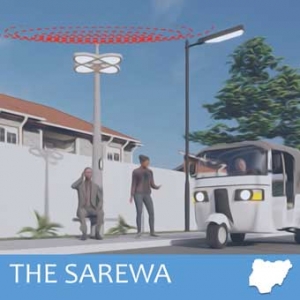Winners Announced: Stanford Center on Longevity Design Challenge “Longevity-Ready Environments: Rethinking Physical Spaces for Century-Long Lives”
Watch the Design Challenge team celebrate this year’s Challenge and break the good news to the winners.
April 6, 2022, Stanford, CA – The Stanford Center on Longevity has named The Sarewa the winner of the 2021-2022 Design Challenge competition. This team beat out 123 other entries from 33 countries over the course of the competition to win the $10,000 grand prize.
The Sarewa team from Ahmadu Bello University in Nigeria saw that auto rickshaw drivers were wasting time and fuel looking for riders, contributing to their city’s air pollution. They presented their design for a modified streetlight that connects passengers to rides without a smart phone.
The second place prize of $5,000 was awarded to Karpolax from Makerere University in Uganda. Upon seeing the amount of food waste in their own city and as represented in global statistics, this team designed a sachet that extends the shelf life of fruit so that it remains fit for consumption longer and reduces profit loss for farmers.
The third place winner, receiving $2,000, was Spore from North Carolina State University and Boston College, USA. The team became aware of the dangers of mold exposure through the experiences of family and friends and designed an in-home mold detection device to help people maintain healthy homes.
View the winners’ and the other finalists’ video presentations:
https://longevity.stanford.edu/design-challenge/2022-finalists-2/
The 2022 Design Challenge theme encouraged students to examine the physical environments in their communities and identify opportunities to design for an environment that better supports long lives. Starting even before birth, environmental factors such as air quality, availability of well-designed outdoor spaces and transit options, living conditions, and toxin exposure can affect physical and mental health.
“The finalists innovated for a wide range of environmental issues that affect health over the life span,” commented Ken Smith, Director of Programs at the Stanford Center on Longevity and Founder of the Design Challenge. “From transportation to food preservation and airborne pollutant detection, these designs all contribute to a healthier environment for people of all ages.”
The winners showed unique insight into which environmental issues are the most salient in their communities. “They came up with clever solutions that can also have a large impact beyond each of their target audiences,” said Marie Conley-Smith, who coordinates the Design Challenge. “It has been inspiring working with each of the finalists and seeing their passion and ambition for innovating for a healthier world.”
The finalists all received a $1,000 finalist award and mentorship leading up to the Finals. The entire competition is industry-sponsored and free to enter, enabling students from all circumstances to participate.
Here are this year’s winners and finalists:

First Prize
The Sarewa
Ahmadu Bello University, Nigeria
A modified streetlight that connects passengers to rides without a smart phone.

Second Prize
Karpolax
Makerere University, Uganda
A sachet using green nanotechnology to extend the shelf life of fruit.

Third Prize
Spore
North Carolina State University & Boston College, USA
A device that detects mold spores in the air.
Finalists
Karpolax (Makerere University, Uganda) – A sachet using green nanotechnology to extend the shelf life of fruit.
Leafin (Universitas Gadjah Mada, Indonesia) – An aeroponic gardening assistant using mobile app-based features and an IoT-integrated planting kit.
Neem extracts natural insecticide (Kwame Nkrumah University of Science and Technology, Ghana) – A natural insecticide to improve crop outcomes without adverse environmental effects.
The Sarewa (Ahmadu Bello University, Nigeria) – A modified streetlight that connects passengers to rides without a smart phone.
Shelco (University of the Arts, United Kingdom) – A dust-capturing modular system for stable, aesthetic, and affordable roofs.
Smultronställe (University of Science Malaysia, Malaysia) – A detachable vertical farming system for urban farming.
Spore (North Carolina State University & Boston College, USA) – A device that detects mold spores in the air.
Tlekuilli (Universidad Autónoma del Etado de Mexico, Mexico) – A stove made from recycled, local materials that reduces smoke exposure for users.
Sponsors
Finance of America Reverse
Honda R&D Americas, Inc.
Target
Procter & Gamble
Eskaton
Judges
Riley Gibson, President, Silvernest
Alan Goldstein, Managing Director, P&G Ventures, Procter & Gamble
Rodney Harrell, Housing Lead and Vice President of Family, Home, and Community, AARP
Todd Murch, President & CEO, Eskaton
Jane Nakagawa, AVP, Automotive Design & UX, American Honda Motor Co., Inc.
About the Design Challenge
The Stanford Center on Longevity Design Challenge is a global competition aimed at encouraging students to design products and services to improve the lives of people across all ages. Established in 2013, the Challenge is focused on ways to motivate and empower people in their daily lives both inside their homes and in their community, particularly as they remain healthy and vigorous long past the traditional beginning of retirement.
The challenge is made possible by generous sponsorship from a number of companies and foundations. Lead sponsorship is provided by Honda R&D Americas, Inc., Target, and Finance of America Reverse. Additional financial support has been provided by Procter & Gamble, and Eskaton.
About the Stanford Center on Longevity
The mission of the Stanford Center on Longevity is to redesign long life. The Center promotes the acceleration and implementation of scientific discoveries, technological advances, behavioral practices, and social norms so that century long lives are healthy and rewarding. Founded in 2007 by Laura Carstensen, PhD and Thomas Rando MD, PhD, the Center works with more than 150 Stanford faculty, their students and research staffs, as well as leaders from industries, thought leaders, and policy makers to develop workable solutions for urgent issues confronting the world as the population ages. For more information, visit https://longevity.stanford.edu
Follow the Stanford Center on Longevity Design Challenge on Twitter (@StanfordLngLife) and via our Facebook pagefor more updates – including announcements on the 2021-2022 Design Challenge!
Media Contact: David Pagano
Email: [email protected]
